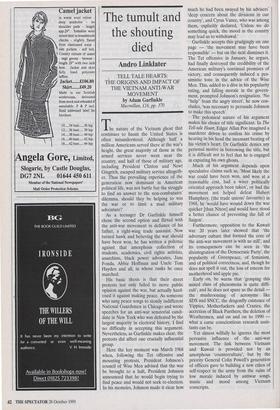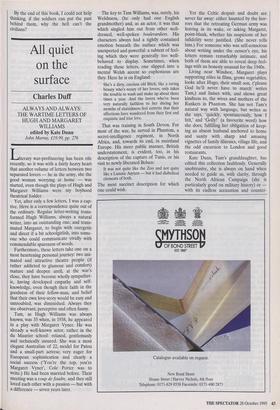The tumult and the shouting died
Andro Linklater
TELL TALE HEARTS: THE ORIGINS AND IMPACT OF THE VIETNAM ANTI-WAR MOVEMENT by Adam Garfinkle Macmillan, £16, pp. 370 The nature of the Vietnam ghost that continues to haunt the United States is often misunderstood. Although half a million Americans served there at the war's height, the great majority of those in the armed services never went near the country, and half of those of military age, including President Clinton and Newt Gingrich, escaped military service altogeth- er. Thus the prevailing experience of the generation now dominant in American political life, was not battle but the struggle to find an answer to the non-combatants' dilemma, should they be helping to win the war or to limit a mad military adventure?
As a teenager Dr Garfinkle himself chose the second option and flirted with the anti-war movement in defiance of his father, a right-wing trade unionist. Now turned hawk and believing the war should have been won, he has written a polemic against that amorphous collection of students, academics, civil rights activists, anarchists, black power advocates, Jane Fonda, Abbie Hoffman and Uncle Tom Hayden and all, in whose ranks he once marched.
His basic thesis is that their street protests not only failed to move public opinion against the war, but actually hard- ened it against making peace. As someone who sang peace songs to stonily indifferent National Guardsmen in Chicago and wrote speeches for an anti-war senatorial candi- date in New York who was defeated by the largest majority in electoral history, I find no difficulty in accepting this argument. Nevertheless, as Garfinkle makes clear, the protests did affect one crucially influential group.
Here the key moment was March 1968 when, following the Tet offensive and mounting protests, President Johnson's council of Wise Men advised that the war be brought to a halt, President Johnson announced that he would begin trying to find peace and would not seek re-election. In his memoirs, Johnson made it clear how much he had been swayed by his advisers' `deep concern about the divisions in our country', and Cyrus Vance, who was among them, explicitly declared, 'Unless we do something quick, the mood in the country may lead us to withdrawal.'
Garfinkle accepts this grudgingly on one page — 'the movement may have been responsible' — but on the next dismisses it. The Tet offensive in January, he argues, had finally destroyed the credibility of the American military's continual promises of victory, and consequently induced a pes- simistic tone in the advice of the Wise Men. This, added to a dive in his popularity rating, and falling morale in the govern- ment, prompted Johnson's resignation. 'No "help" from the angry street', he now con- cludes, 'was necessary to persuade Johnson to make this speech'.
The polemical nature of his argument makes his choice of title significant. In The Tell-tale Heart, Edgar Allan Poe imagined a murderer driven to confess his crime by hearing in his head the incessant beating of his victim's heart. Dr Garfinlde denies any personal motive in borrowing the title, but it is difficult not to feel that he is engaged in expiating his own ghosts.
Much of his argument depends upon speculative claims such as, 'Most likely the war could have been won, and won at a reasonable cost, had a wiser politically oriented approach been taken', or had the movement not helped defeat Hubert Humphrey, (the trade unions' favourite) in 1968, he 'would have wound down the war quicker [than Nixon] and would have stood a better chance of preventing the fall of Saigon'.
Furthermore, opposition to the Kuwait war 20 years later showed that `the adversary culture that formed the core of the anti-war movement is with us still', and its consequences can be seen in 'the disintegration of the Democratic Party', the popularity of Greenpeace, of feminism, and of political correctness, and, though he does not spell it out, the loss of esteem for motherhood and apple pie.
Early on, he warns that 'grasping this mixed class of phenomena is quite diffi- cult', and he does not spare us the detail the mushrooming of acronyms like SDS and SNCC, the dragonfly existence of Yippies, Motherfuckers and Crazies, the accretion of Black Panthers, the deletion of Weathermen, and on and on to 1990 what a curse conscientious research assis- tants can be.
Yet almost wilfully he ignores the most pervasive influence of the anti-war movement. The link between Vietnam and Kuwait is provided not by an amorphous 'counterculture', but by the priority General Colin Powell's generation of officers gave to building a new ethos of self-respect in the army from the ruins of low morale induced by antiwar songs, music and mood among Vietnam conscripts. By the end of this book, I could not help thinking, if the soldiers can put the past behind them, why the hell can't the civilians?



































































 Previous page
Previous page